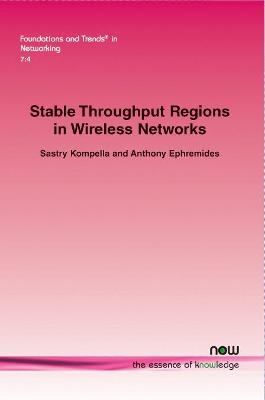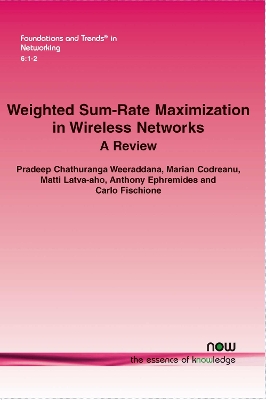Foundations and Trends (R) in Networking
2 total works
Stable Throughput Regions in Wireless Networks
by Sastry Kompella and Anthony Ephremides
Published 13 March 2014
Stable Throughput Regions in Wireless Networks examines the fundamentals of stable throughput in wireless networks. It reviews the notion of stability and of stable throughput regions in wireless networks, with emphasis on network layer cooperation between interacting users.
After a brief introduction, it examines in detail specific instances of the stability issue. These instances differ from each other in terms of the network, channel and traffic models they use. What they share is the notion of how stability is affected by node cooperation, as well as the notion of ""interacting queues"" that makes the stable throughput analysis difficult and often intractable.
This review is intended to provide a reference point for the rich set of network control problems that arise in the context of queue stability in modern and future networks.
After a brief introduction, it examines in detail specific instances of the stability issue. These instances differ from each other in terms of the network, channel and traffic models they use. What they share is the notion of how stability is affected by node cooperation, as well as the notion of ""interacting queues"" that makes the stable throughput analysis difficult and often intractable.
This review is intended to provide a reference point for the rich set of network control problems that arise in the context of queue stability in modern and future networks.
Weighted Sum-Rate Maximization in Wireless Networks
by Pradeep Chathuranga Weeraddana, Marian Codreanu, Matti Latva-aho, Anthony Ephremides, and Carlo Fischione
Published 15 October 2012
The weighted sum-rate maximization (WSRMax) problem plays a central role in many network control and optimization methods, such as power control, link scheduling, cross-layer control, network utility maximization. The problem is NP-hard in general.
This is a cohesive discussion of the existing solution methods associated with the WSRMax problem, including global, fast local, as well as decentralized methods is presented. In addition, general optimization approaches, such as branch and bound methods, complementary geometric programming, and decomposition methods, are discussed in depth to address the problem.
Through a number of numerical examples, the applicability of the resulting algorithms in various application domains is demonstrated. The presented algorithms and the associated numerical results can be very useful for network engineers or researchers with an interest in network design.
This is a cohesive discussion of the existing solution methods associated with the WSRMax problem, including global, fast local, as well as decentralized methods is presented. In addition, general optimization approaches, such as branch and bound methods, complementary geometric programming, and decomposition methods, are discussed in depth to address the problem.
Through a number of numerical examples, the applicability of the resulting algorithms in various application domains is demonstrated. The presented algorithms and the associated numerical results can be very useful for network engineers or researchers with an interest in network design.

